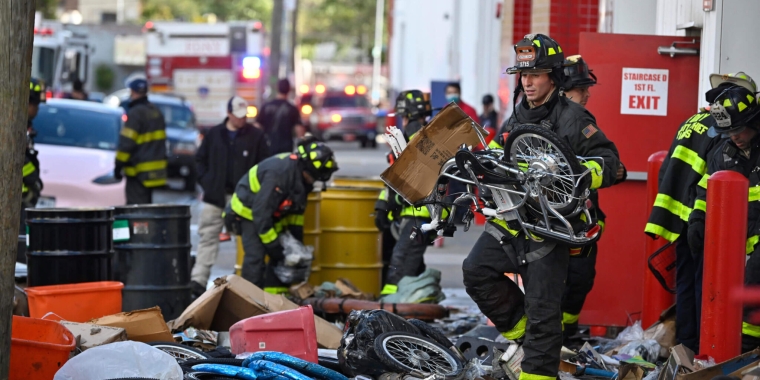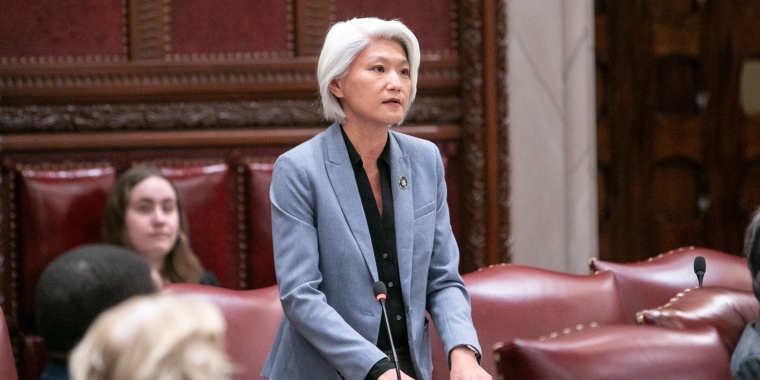
Brooklyn legislators look to reinforce e-bike battery safety after multiple deadly fires

In November, a fire caused by a lithium-ion e-bike battery in Crown Heights killed three people and injured 14. Lithium-ion batteries were also to blame for a Bushwick blaze that injured five people in October, and for an inferno that destroyed a Sunset Park storage facility just a few days later.
The rechargeable batteries are some of the most energy-dense batteries on the market and can last up to 500 charges, making them the most popular battery for electric bikes and scooters, and sometimes cell phones. When damaged or ill-stored — which e-bike batteries often are — lithium-ion batteries are prone to exploding and causing dangerous, often deadly fires. The batteries have contributed to at least 239 fires and 17 deaths citywide so this year.
To try to improve battery safety, state Sen. Iwen Chu introduced a package of four bills for manufacturers and users of motorized bikes this month, with the support of several state Assembly Members and the Uniformed Firefighters Association.
Chu represents the Senate’s 17th District, which encompasses parts of Sunset Park, Bensonhurst, Bath Beach, Bay Ridge, Dyker Heights and Kensington, and has seen its fair share of battery-related blazes over the years.
“The dangers posed by lithium-ion batteries have gone unchecked long enough and have led to too many fires across New York City and in the communities I represent,” Chu said at a press conference in Sunset Park, at the site of a May 2022 lithium-ion battery fire. “I have five cases of e-bikes explosions which lead to hundreds of families to be displaced.”
According to scientific research, e-bike fires often begin when one cell in a lithium-ion battery will often malfunction, causing something called “thermal runaway,” when the cell generates more heat than it can release. When that happens, the battery can spontaneously catch fire or explode — and, if the malfunctioning battery is stored near other e-bikes or batteries, the blaze will usually cause them to catch fire, too.
FDNY commish Laura Kavanagh warned after the deadly Crown Heights fire that unregulated, uncertified lithium-ion batteries and chargers are particularly dangerous.
Under Chu’s proposed regulations, all e-bikes and scooters would need to be tested and approved by the Underwriters Laboratories (UL) — an organization dedicated to safety testing and quality control — before hitting the market.
In September, Mayor Eric Adams passed a law restricting what kinds of e-bikes and scooters can be sold in New York City and requiring them to have the UL Mark — which he described as “a safety stamp of approval that is a gold standard in the United States.”UL certification can be found on most household appliances, including toasters and refrigerators. However, unapproved e-bikes and batteries are still sold, and are often much cheaper than approved vehicles, said Adam Barowy, a research engineer with the UL Fire Safety Research Institute.
As lithium-ion battery fires increase, the FDNY has recommended that e-bike owners and riders only use the supplied charger that comes with an approved e-bike instead of a different one that might not be entirely compatible or that might not be UL approved, and to not charge them overnight, to store e-bikes in open spaces, keep them away from heat and to dispose of batteries safely.
Chu’s legislation would also require e-bike dealers, repair shops or storage services to have fire protection measures like fire extinguishers, battery cases and automatic monitoring and detection of fire.
“The Uniformed Firefighters Association proudly stands in support of Senator Iwen Chu’s proposed landmark legislation that would require automatic fire monitoring and Class-B fire extinguishers in all e-bike shops, as well as set new standards for testing and certifying batteries used in micro-mobility devices,” said Uniformed Firefighters Association Vice President Robert C. Eustace, in a statement. “Senator Chu clearly understands the urgency in passing such legislation to protect not just property, but the lives of New York City residents and first responders.”
In addition to addressing fire safety, the bill also addresses street safety by requiring manufacturers to put a notice on all e-bikes or scooters with lithium-ion or any electric batteries stating that they cannot be driven on sidewalks and on roads with speed limits over 30 miles per hour, unless otherwise permitted, and that they must obey all traffic laws. Some e-bikes have the capacity to exceed 55 miles per hour.
“It is without a doubt that electric vehicles are going to be a defining mode of transportation in the coming decade”, said Assembly Member Christopher Eachus, of Orange County, at the bill announcement. “As a physics teacher for over 40 years who has built and raced [electric vehicles] around the world, I understand the intricate pieces that make up these new technologies, and more importantly the safety precautions needed to use them. As we move forward with expanding and encouraging EV usage to consumers across NYS, it is imperative that we do it with the safety of our constituents top of our mind. These bills do exactly that, and in doing so support our leap into a cleaner future.”
There are roughly 65,000 food-delivery workers across the five boroughs, according to the New York Times. Most of them use e-bikes and scooters daily, and many more New Yorkers use the bikes as a means of transportation and recreation.
“[Parent-Child Relationship Association] has assisted families after the traumatic experience of surviving a fire and seen the dangers it poses to communities,” said Nicole Huang, director of the Parent-Child Relationship Association, in a statement. “To prevent future tragedies, the State and City government need to act urgently to regulate e-bike lithium-ion batteries. We cannot wait for the next fire that could potentially take an innocent life and destruction of property.”

